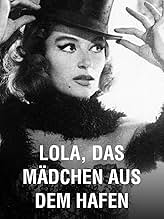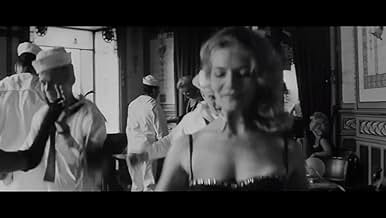ÉVALUATION IMDb
7,4/10
8,2 k
MA NOTE
Un jeune homme qui s'ennuie retrouve son ancienne petite amie, désormais danseuse de cabaret et mère célibataire, et retombe bientôt amoureux d'elle.Un jeune homme qui s'ennuie retrouve son ancienne petite amie, désormais danseuse de cabaret et mère célibataire, et retombe bientôt amoureux d'elle.Un jeune homme qui s'ennuie retrouve son ancienne petite amie, désormais danseuse de cabaret et mère célibataire, et retombe bientôt amoureux d'elle.
- Nominé pour le prix 2 BAFTA Awards
- 2 victoires et 3 nominations au total
Annie Duperoux
- Cécile Desnoyers
- (as Annie Dupéroux)
Dorothée Blanck
- Dolly
- (as Dorothée Blank)
Avis en vedette
Jacques Demy makes his feature length debut in a solidly crafted drama that signaled great things to come. Demy is able to craft enjoyable characters in a film that interconnects their stories in a rather beautiful way. Thematically, our characters seek purpose, with themselves and with one other. The way Demy is able to interconnect and mirror these stories is very well done. Add to that some nice black & white camera work and you have film that demonstrates Demy's unique style and sets him apart from other directors.
Demy's films of the 1960s laid out the whimsies, joys and terrors of the Nouvelle Vague generation, not through the parodic dissections of Godard, nor the eerie doublings of Resnais or early Varda, nor the rebellions of Truffaut's 400 Blows, not through encounters with malign authority, but through the networks of friendship, love and relation more often the terrain on which life is explicitly lived and experienced. As a kind of try-out for the musicals-shot as a conventional narrative film without sung only because of a lack of resources, but with a glorious Legrand soundtrack anyway-Lola is at once more sombre/sober and equally preoccupied with the same shadings of mood, somewhere between a feminist, or at least non-misogynist portrayal of an independent woman not subject to judgment, and the stereotypical figures that populate heterosexual romance. The use of locations as repositories of memory and of their own mythology-Roland's return in 'Parapluies' or the much darker return to the arcades in 'Un Chambre En Ville'-begins here. The Demy creed: "There's a bit of happiness in simply wanting happiness". It's hard not to get sucked in.
Jacques Demy's effervescent romance is one of the best and most enduring examples of the stylistic explosion since called the French New Wave, but compared to Resnais' often-tortured exposition and Godard's turgid socio-political cul-de-sacs this playful look at the mysteries of first love is alive with an almost irresistible vitality. Demy pursues with tongue-in-cheek determination the idea that life can be a series of happy accidents, weaving several interlocked plot threads into a delicate web of chance and coincidence to illustrate the casual symmetry of life and love. At the heart of the film is a young cabaret dancer waiting (against reason) for her American sailor to return, whose sometimes sad, sometimes comic story is oddly echoed in the lives of everyone around her. It's as if the world were an endless progression of dancers and sailors, destined to mingle and mix in a never-ending attempt to rekindle that first, unforgettable spark of passion.
...You would know that,in Chicago,there are no sailors but gangsters.That's what the mother tells her daughter who became friend with an American!This is one of the funniest lines of a wonderful movie.
There's a tight connection between "Lola" and Demy's following movie "les parapluies de Cherbourg":
-Lola is an unmarried mother,Genevieve becomes one too. Both are waiting for a lover,in a harbor .(Nantes for Lola,Cherbourg for Genevieve)
-Marc Michel's character,Roland appears in both movies!In love with Lola,he is rejected.In "les parapluies",his memories come back for a very short while: a flashback displays pictures of Nantes,where Lola's story took place .And he told Genevieve's mother about his long lost love.
-In "Lola" ,Roland wants to marry the heroine and to become her(not his) son's father.In "les parapluies",he marries Genevieve and becomes her (not his) son's father.
-Both movies display ordinary people,whose ordinary life is shown with emphasis but not without taste ,as if all this were written in verse.What's the matter if "Lola" is a "normal" movie and "les parapluies " an entirely sung one.Demy's touch makes both winners.
-Both movies -and it was to continue with "les demoiselles de Rochefort" and the marvelous "Donkey Skin"- favor the scenery:the black and white shots in "Lola" are at least as unreal and as dreamlike as the vivid colors in "les parapluies"(influenced by American musicals of the fifties)
-Both movies feature families without a father figure:the mother and the daughter I mention above ,we find them back in "les parapluies.." and even later in "les demoiselles de Rochefort".But in this latter work,it's the mother who's an unmarried mother.
"Les parapluies de Cherbourg" is praised and loved everywhere,but "Lola"'s still crying to be seen.Like Roland ,Lola will come back in another Demy's movie ,made in America: "Model Shop"(1968).Leonard Maltin says that "Demy's eye for LA is striking ,but overall feel to story is ambiguous".It's not on a par with Lola,though.
There's a tight connection between "Lola" and Demy's following movie "les parapluies de Cherbourg":
-Lola is an unmarried mother,Genevieve becomes one too. Both are waiting for a lover,in a harbor .(Nantes for Lola,Cherbourg for Genevieve)
-Marc Michel's character,Roland appears in both movies!In love with Lola,he is rejected.In "les parapluies",his memories come back for a very short while: a flashback displays pictures of Nantes,where Lola's story took place .And he told Genevieve's mother about his long lost love.
-In "Lola" ,Roland wants to marry the heroine and to become her(not his) son's father.In "les parapluies",he marries Genevieve and becomes her (not his) son's father.
-Both movies display ordinary people,whose ordinary life is shown with emphasis but not without taste ,as if all this were written in verse.What's the matter if "Lola" is a "normal" movie and "les parapluies " an entirely sung one.Demy's touch makes both winners.
-Both movies -and it was to continue with "les demoiselles de Rochefort" and the marvelous "Donkey Skin"- favor the scenery:the black and white shots in "Lola" are at least as unreal and as dreamlike as the vivid colors in "les parapluies"(influenced by American musicals of the fifties)
-Both movies feature families without a father figure:the mother and the daughter I mention above ,we find them back in "les parapluies.." and even later in "les demoiselles de Rochefort".But in this latter work,it's the mother who's an unmarried mother.
"Les parapluies de Cherbourg" is praised and loved everywhere,but "Lola"'s still crying to be seen.Like Roland ,Lola will come back in another Demy's movie ,made in America: "Model Shop"(1968).Leonard Maltin says that "Demy's eye for LA is striking ,but overall feel to story is ambiguous".It's not on a par with Lola,though.
This director is ROMANTIC! I think he rightly shows the astonishing contrast between love being generated by complete chance and fleeting encounter - with its lasting consequence and possibly enduring devotion. I just loved it.
One of the things that is so winning about this movie (also true of The Umbrellas of Cherbourg) is how very modest the characters -- and the movie - are.
The characters are sincere - if they lie, they apologize later - and unafraid to say when they are greatly moved -- and when they aren't.
I think both movies wonderfully portray mother - daughter relationships - and both are quite sympathetic to men as well as women.
How often do you see movies that show the truth of men's emotions wracked by romantic feelings (rather than solely lust) - sometimes returned and sometimes not? Very seldom.
In some ways, I prefer Lola to Umbrellas because the plot is more ingenious, the vividly drawn characters more numerous - so there is more to engross one. (On the other hand, by concentrating on just the love for one woman, Umbrellas creates an agony in the viewer that is more powerful than any feeling in Lola).
Just see it - and you'll see many disparate pieces pull together in a wonderfully satisfying, utterly charming, wonderful romantic tale.
Lola and Umbrellas make me anxious to see the Young Girls of Rochefort.
One of the things that is so winning about this movie (also true of The Umbrellas of Cherbourg) is how very modest the characters -- and the movie - are.
The characters are sincere - if they lie, they apologize later - and unafraid to say when they are greatly moved -- and when they aren't.
I think both movies wonderfully portray mother - daughter relationships - and both are quite sympathetic to men as well as women.
How often do you see movies that show the truth of men's emotions wracked by romantic feelings (rather than solely lust) - sometimes returned and sometimes not? Very seldom.
In some ways, I prefer Lola to Umbrellas because the plot is more ingenious, the vividly drawn characters more numerous - so there is more to engross one. (On the other hand, by concentrating on just the love for one woman, Umbrellas creates an agony in the viewer that is more powerful than any feeling in Lola).
Just see it - and you'll see many disparate pieces pull together in a wonderfully satisfying, utterly charming, wonderful romantic tale.
Lola and Umbrellas make me anxious to see the Young Girls of Rochefort.
Le saviez-vous
- AnecdotesThis, Jacques Demy's first film, is a tribute to Max Ophüls.
- Citations
Roland Cassard: I've thought a lot about you and me. It doesn't matter now. It's not your fault or mine. It's just how it is. We're alone and we stay alone. But what counts is to want something, no matter what it takes. There's a bit of happiness in simply wanting happiness.
- ConnexionsEdited into Il était une fois Michel Legrand (2024)
- Bandes originales7ème Symphonie
Music by Ludwig van Beethoven (as Beethoven)
Meilleurs choix
Connectez-vous pour évaluer et surveiller les recommandations personnalisées
- How long is Lola?Propulsé par Alexa
Détails
- Date de sortie
- Pays d’origine
- Site officiel
- Langues
- Aussi connu sous le nom de
- Lola, das Mädchen aus dem Hafen
- Lieux de tournage
- La Baule, Loire-Atlantique, France(Michel drives into town)
- société de production
- Consultez plus de crédits d'entreprise sur IMDbPro
Box-office
- Brut – États-Unis et Canada
- 103 951 $ US
- Brut – à l'échelle mondiale
- 103 951 $ US
- Durée1 heure 30 minutes
- Couleur
- Mixage
- Rapport de forme
- 2.35 : 1
Contribuer à cette page
Suggérer une modification ou ajouter du contenu manquant

































